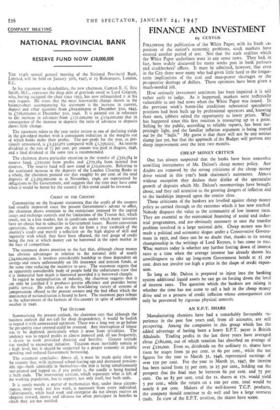FINANCE AND INVESTMENT
By CUSTOS
ForiowING the publication of the White Paper, w:ith its frank ex- position of the nation's economic problems, stock markets have entered another period of test. Not that the stark realities which the White Paper underlines were in any sense news. They had, in fact, been widely discussed for many weeks past in bank parlours and stockbrokers' offices. It must be admitted, however, that even in the City there were many who had given little heed to the longer- term implications of the coal and man-power shortages or the prospective shortage of dollars. These optimists have been given a much-needed jolt.
How seriously investment sentiment has been impaired it is still rather early to judge. As it happened, markets were technically vulnerable to any bad news when the White Paper was issued. In the previous -week's boom-like conditions substantial speculative positions had been built up by professional operators and, knowing their men, jobbers seized the opportunity to lower prices. What has happened since this first reaction is reassuring up to a point. Selling by the public, according to reliable reports, has been sur- prisingly light, and the familiar inflation argument is being trotted out by the " bulls." My guess is that there will not be any serious slump just yet, but that the approach of the Budget will prevent any sharp improvement over the next two months.
CHEAP MONEY CRITICS
One has always suspected that the banks have been somewhat unwilling instruments of Mr. Dalton's cheap money policy. Any doubts are removed by the strong criticisms of the cheap money drive voiced in this year's bank chairmen's statements. Almoit without exception they declare their dislike of the spectacular growth of deposits which Mr. Dalton's manoeuvrings have brought about, and they call attention to the growing dangers of inflation and to the hardships imposed upon the rentier class.
These criticisms of the bankers are levelled against cheap money policy as carried through to the extremes which it has now reached. Nobody disputes the value to the community of low interest rates. They are essential to the economical financing of social and indus trial programmes, and are obviously necessary to ease the transfer problem involved in a large national debt. Cheap money was first made a political and economic slogan under a Conservative Govern- ment in 1932, and there can be no doubt that, thanks to its strong' championship in the writings of Lord Keynes, it has come to stay. What matters today is whether any further forcing down of interest rates at a time when the average investor has already shown his unwillingness to take up long-term Government bonds at 2i per cent. does not involve too high a price in the shape of credit expan- sion.
So long as Mr. Dalton is prepared to injeot into the banking system additional liquid assets he can go on forcing down the level of interest rates. The question which the bankers are raising is whether the time has not come to call a halt in the cheap money drive and to a process of credit inflation whose consequences can only be prevented by rigorous physical controls.
AN E.P.T. SHARE Manufacturing chemists have had a remarkably !avowable 'rx- perience in the past few years.and, from all accounts, are still prospering. Among the companies in this group which has the added advantage of having been a heavy E.P.T. payer is British Alkaloids. Trading profits in the last three years have averaged about £18o,000, out of which taxation has absorbed an average of over £120,000. Even so, dividends on the ordinary is. shares have risen by stages from 3o per cent. to. 6o per cent., while the net figures for the year to March 31, 1946, represented earnings of over 15o per cent. For the year to March 31, 1947, the interim has been raised from 15 per cent. to 25 per cent., holding out the prospect that the final may be between 6o per cent. and 75 per cent. On an 85 per oent. total the is. shares at 17s. would yield 5 per cent., while the return an a roo per cent, total would be nearly 6 per cent. Makers of the well-known T.C.P. products, the company should continue to do well and has a large overseas trade. In view of the E.P.T. position, the shares have scope.


































 Previous page
Previous page